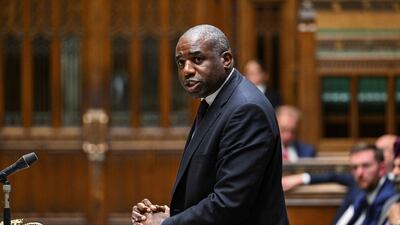After almost a year of pressure to take action against Israel’s most extreme government members, Britain imposed sanctions on two cabinet ministers whose actions “led to the deaths” of Palestinians.
In the hardest-hitting statement from the British government to date, Middle East minister Hamish Falconer outlined the case against Security Minister Itamar Ben-Gvir and Finance Minister Bezalel Smotrich.
To supportive shouts from Labour MPs, Mr Falconer stated that the ministers incited settler violence in the occupied West Bank “which has led to the deaths of Palestinians civilians and the displacement of whole towns and villages”.
Britain, along with Australia, New Zealand, Canada and Norway, would “not sit by while they wreck the prospects of future peace”.
While Israel’s government has acted with expected outrage, the sanctions have the potential to damage relations with the US, after Secretary of State Marco Rubio criticised the move.
“The United States condemns the sanctions imposed,” he tweeted. Then, referring to the actions of Hamas, he said: “We remind our partners not to forget who the real enemy is.
“The United States urges the reversal of the sanctions and stands shoulder to shoulder with Israel."
The tweet was quickly picked up by Mr Ben-Gvir who thanked Mr Rubio then stated that the Trump administration was “a moral compass” showing direction when other countries “choose to appease terrorist organisations like Hamas”.
The path to sanctioning Israel’s hardline cabinet members over Gaza has been arduous, bruising and, for many in the UK’s Labour government, long overdue.
Former Conservative foreign secretary David Cameron was exasperated at Israel’s intransigence over aid to Gaza and almost sanctioned Mr Ben-Gvir and Mr Smotrich in the spring of last year but the July general election intervened.
In opposition, Labour had been rattled after Keir Starmer admitted in a radio interview shortly after the October 7 attacks that Israel had the “right” to cut off power and water to Gaza to enforce a siege.
That weighed heavily on the July election when Labour lost four stronghold seats to Muslim independents standing on a pro-Gaza platform.

Shaken and outraged by reports of death and human misery in Gaza, Labour MPs have since berated the government at every opportunity for not sanctioning the pair.
The path to that action has been tentative, and for the Labour front bench, quite painful.
Initially in September, it hoped to quell the disgruntled voices – and pressure Israel – by imposing a partial arms embargo on 30 weapons export licences to the country.
The first hint of sanctions came in October after Mr Starmer, as Prime Minister, announced that action was being considered following new incendiary comments from the pair.
Mr Smotrich had stated that starving two million people in Gaza “might be justified and moral”, while Mr Ben-Gvir labelled illegal West Bank settlers who killed a teenage Palestinian as “heroes”.
But with the diplomatic push for a ceasefire with Hamas and release of Israeli hostages in the new year, the pressure for action receded.
That was until Israel resumed its latest grim offensive, with MPs in March accusing the British government of double standards on its position towards the country.
The beleaguered Foreign Secretary was sent by Downing Street to make a statement in the Commons largely to placate the anger of Labour backbenchers fed up with the government’s position on Israel.
David Lammy admitted there had been an “appalling loss of life”, and said the UK was working with France and Germany to send Israel a “clear message” that they “strongly oppose” the resumption of hostilities.
By April, The National had been told in confidence that Mr Lammy was now actively pushing for the pair to be sanctioned – as well as Palestinian state recognition – such was the anger felt in London over the humanitarian blockade and continued loss of life.
It became clear last month that relations with Israel had reached breaking point. Suddenly Mr Lammy’s language had changed, condemning the country’s actions in Gaza as “intolerable” and “repellent”.
“We must call this what it is. It is extremism. It is dangerous, it is repellent,” Mr Lammy told Parliament. “I condemn it in the strongest possible terms.”
Throughout last year, Labour backbench MPs were outspoken in putting pressure on the government to change its stance. Joined by the Lib Dems, and a handful of Conservatives, their voices have been listened to with the action now taken.
But the pressure will not stop there. Calls will intensify for recognition of a Palestinian state and a full arms embargo.
A new line of attack emerged on Tuesday, when Mr Lammy was asked why sanction the ministers but not Israel's Prime Minister Benjamin Netanyahu himself. His response was that the pair had used “horrendous extremist language”, indicating that their boss had not.
Britain’s and its allies’ actions have affected the Israeli government, which condemned them as “outrageous”. Yet it will probably take Israel's strongest ally, the US, to change its position for a significant impact on its actions.
Mr Falconer also warned that the two-state solution “is in peril” due to the “catastrophic conflict in Gaza and a shocking deterioration in the West Bank”.
Israel’s actions were “an attempt to entrench a one state reality where there are no equal rights”, he stated.


